- Home
- Shirlee McCoy
Home Again Page 3
Home Again Read online
Page 3
“Of course he isn’t,” Clementine assured her.
“Then why does he have a gun?”
“Because I work for a private security company, kiddo,” Porter responded. “I protect people from assassins and criminals.”
“You weren’t supposed to hear that! Heavenly said she’d have my head if I told you that I knew.” Twila swung around so quickly, she nearly tumbled off the dock.
“Whoa!” Clementine managed to grab the back of her pajamas and yank her away from danger, but she was done. Done. There was no way on God’s green earth she was spending another second on that dock. “Come on. Let’s go.”
“I’m not ready.”
“You’re going to have to be,” she said.
“Mommy always says to follow our hearts. My heart led me here, and I’m staying until I’m done,” Twila said stubbornly.
“Would your mother allow you to be on this dock? Ever? Even if your heart led you to it?” Clementine countered. Thank God, she had some history with the Bradshaw kids. She’d babysat for them on plenty of occasions before Sim left her. She’d established enough of a relationship with each of them to know which buttons to push to get them to cooperate.
“Mommy isn’t here, so I don’t know if she would,” Twila replied.
“You know that she wouldn’t,” Clementine corrected, taking Twila’s hand and turning away from the river. “Because this isn’t a safe place, and it would break her heart if anything happened to you.”
“It’s a very safe place. I come out here all the time,” Twila said, but she didn’t resist as Clementine led her back to the shore.
“All the time?” Porter asked calmly, but the sun was peeking above the mountains, golden light seeping across the horizon, and Clementine could see the tightness of his jaw and the sharp edge to his gaze. Any amusement he’d felt at being called an assassin was gone. Probably replaced by terror at the thought of Twila spending lots of unsupervised time on the dock.
“Yes.”
“Sullivan and Rumer know about this?” he asked, his voice still calm and carefully modulated.
“I might not have asked them. After school, I come here to study because the twins and Moisey are so loud. It’s hard to concentrate.” Twila stepped off the dock ahead of Clementine, trying to skirt past her uncle. Probably hoping to avoid further questions.
He stepped in front of her, crouching so they were eye to eye. “Don’t ever do that again, okay? Don’t ever come here to study or to think or to just sit on the dock without asking first.”
“Why not? I used to come here with Daddy all the time. He showed me what boards weren’t too rotted to walk on.”
“You came here with him. Not alone. If you want to come again, tell me. I’ll bring you down, and I’ll make sure the dock is safe before I do it,” he said, brushing a loose strand of hair from her cheek.
Something inside Clementine shifted as she watched.
That icy cold place in her heart, the one that had been there since the day she’d realized Sim had left and taken everything of value with him, melted. Just a little. Just enough for her to wonder how someone who looked as tough as Porter could be so gentle.
Twila seemed to wonder the same. She eyed him for a moment, and then said, “You’re really not an assassin?”
“No, I’m not,” he assured her.
“You’re one of the good guys?”
“I try to be.” He straightened. “You said you come down here all the time.”
“I won’t anymore.”
“Good, but I’d like to know how you managed to get out of the house without Rumer seeing you.”
“I climbed out my window.”
For a split second, Clementine could see the fear in Porter’s eyes. It was there and gone so quickly, she’d have missed it if she hadn’t been looking.
“You’re on the second floor of the house.”
“I have the fire escape ladder, Uncle Porter. It is perfectly safe.”
“Is it?” he murmured, running his hand over his short-cropped hair.
“Yes. Daddy showed us how to use it. We practiced a lot. We even had fire drills. Just in case there was ever a fire. We’re all supposed to meet near the tree swing. Did you know that?”
“No. I didn’t.” He cleared his throat. “From now on, you can only use the ladder if there’s a fire,” he said. “Okay?”
Twila frowned, but shrugged. “You should probably tell Heavenly that, too.”
“Your sister climbs out the window?” His eyes narrowed, and he glanced toward the house. Obviously trying to figure out exactly how he could keep kids from escaping it.
“Sometimes. But don’t tell her I told. She’ll be angry.”
“Right. We wouldn’t want that. Come on. Let’s go home.” He put his hand on her shoulder, steering her back to the path that led away from the river.
Clementine should have taken that as her cue to return to the tractor and her work. She didn’t want to get involved in the family’s drama. She had enough drama of her own.
For some reason, though, she followed them along the path and across the road, past the field she’d been plowing and into the yard at the back of the Bradshaws’ house. A large oak stood in the center of it, an old swing hanging listlessly from a thick branch. Sunday used to sit there on warm summer days, watching as her kids raced around the yard, playing and laughing. She’d been there at other times, too. Clementine had seen her late at night, when the house was dark and the world was quiet, sitting alone, a small flashlight trained on the page of a book she was reading. No e-reader for Sunday. She’d liked to hold her books, to carry them around in oversized purses or tucked into the pocket of her jackets. She’d been a sweet, funny, hardworking lady, and she’d deserved better than what she’d gotten.
Porter and Twila walked up the porch stairs. He opened the back door. “Inside and into bed. No snacks. No books. What you did was dangerous, and if you repeat it again, I’ll take away your library card for a month.”
“My library card?” she asked, her hands on her hips, her dark eyes blazing. “Mommy would never do that.”
“She might if she knew you were climbing out the window and going down to the river at night,” he responded.
“She won’t know, because she isn’t here. If she were,” she replied, her voice breaking, “I would never do that.”
“Twila—” he began, but she darted into the house, closing the door with a quick, hard snap.
“Well,” he muttered, still facing the closed door. “That went well.”
“If your definition of well is upsetting a ten-year-old, then I guess it did,” Clementine replied. She meant it as a joke, but Porter didn’t take it that way.
He swung around, standing in the yellow glow of the exterior light, his jaw shadowed with a beard, the muscles in his shoulders and arms bunched with tension. “This isn’t my thing, Clementine. I don’t do kids.”
“You’re standing on the back porch of a house filled with them. Obviously, you do.”
“Let me rephrase that: I don’t do well with kids. I don’t have them, don’t want them, would rather avoid them at all cost.”
“You sound like my ex.” The words slipped out, shouting bitterness as loudly as the gold and pink streaks on the horizon shouted dawn.
“From your tone, I’d say that’s not a good thing.”
“I shouldn’t have said that.” She turned, heading back to the abandoned tractor and hoping Porter wouldn’t follow.
Of course, he did.
The story of her life on repeat these past few years: Hope. Pray. Believe. Be disappointed.
“You didn’t answer my question,” Porter said, stepping into place beside her, his long stride shortened to match hers.
“You didn’t ask one.”
“I thought you’d get the implication, but since you didn’t: Is being compared to your ex as bad a thing as it sounds?”
“Yes, but I’m sure you’re nothing like
him.”
“What’s he like?”
“He’s not worth talking about.”
“You brought him up.”
“I shouldn’t have.”
“So you said.”
“There are six kids in that house who are a lot livelier than this conversation. Maybe you should go check on them?”
“Are you giving me the brush-off?”
“Yes.”
He laughed, the sound like a well-told story. Deep. Rich. Full. Satisfying.
She could feel her lips twitching in response, her muscles relaxing. “I’m glad my honesty amused you. I’ve got a lot of work to do, so I’d better get to it. See you around, Porter.”
“Work is what I wanted to talk to you about,” he replied.
“The farm you mean?”
“Yes.”
“You picked an odd time for the conversation,” she responded.
“It’s an odd time for just about anything. Not quite daylight and definitely not dark.” He gestured to the horizon, ripe with dawn but not yet completely light. “It’s the time I have, though. The baby wakes up at seven. On the dot.”
“Babies are notorious for putting a wrench in the works and changing schedules unexpectedly. It would probably be best if you weren’t out here if Oya wakes up.”
“You know a lot about babies?” he asked hopefully.
“Probably about as much as you know about farming,” she responded, heading toward the field again. If he wanted to follow, so be it. “I have siblings, though. They have kids. I’ve heard stories of toddlers raiding cookie jars at midnight and fingernail polishing the walls in the wee hours of the morning.”
“I woke Heavenly before I left the house. She’s sleeping in the room with Oya and Moisey until I return. Plus, Rosie Whipple is stepping in as a nanny until Sullivan and Rumer return.”
Rosie Whipple?
Clementine had never heard of her. Not that she spent much time meeting people in town. Especially since she’d returned. “A friend of yours?” she asked, assuming the new live-in must be familiar to the family. Porter might not know anything about kids, but if he worked for a private security firm, he knew a lot about danger and about keeping people safe. She doubted he’d let just anyone work around the kids.
“Rosie is a friend of Rumer’s grandmother. She used to own a day care in Spokane. Now she’s retired.”
“Not if she’s helping around the Bradshaw house,” she responded, and he smiled.
“Yeah. It isn’t much of a retirement, but she was bored and needed extra cash for a trip she’s got planned in the summer. Between the two of us, the kids are never unattended. They’re just very good at escaping when they want to.”
“I didn’t mean to imply that they weren’t being supervised carefully enough.”
“Sure you did,” he said easily. “Now, about the work you’ve been doing around here. We really appreciate it. I wanted to thank you.”
“Sullivan thanks me all the time,” she said truthfully, moving a little more quickly, because she wanted to end the conversation and get back to work. The sun was rising rapidly, pink and gold and purple lightening the gray-blue sky. Even with the chill of winter still in the air, the sun would be hot by late morning.
“You deserve more than thanks. Flynn owns a ranch in Texas. He’s got a decent idea of what the going rate for a farmhand is, but you’re more of a farm manager–farmhand–farm owner all rolled into one.”
“I don’t want to be paid.”
Not because she didn’t need the money.
God knew she did.
But because the Bradshaw kids needed it more.
“You’re a professor, right?”
“I don’t recall telling you that, but yes.”
“And you could be working at the University of Washington this semester.”
“Look, Porter, I’m not sure where you’re headed with this, but I’m not comfortable with the fact that you know what I do and where I work.”
“It’s common knowledge, Clementine.”
“Whose knowledge?”
“The sheriff’s. The people in town.”
She’d concede that was probably the case. She’d lived in the ranch house for two years before the fiasco with Sim.
“I’m picking up classes on campus in the fall. Full-time. Right now, I’m teaching online classes. I travel to Seattle once a week to meet with students. But I don’t see what that has to do with the farm.” She climbed onto the tractor, ready to start the engine and finish the row.
He was standing right beside her, though, his hand resting on the tire. His knuckles were nicked and scarred, his forearm tan.
“With your education and experience, you could be doing a lot of things that would bring you a healthy salary,” he said.
“I haven’t built my life on costly things.” Though she’d sure as heck like to have a little extra money for things like tires and tools. “Besides, Sunday helped me out when I needed it. I’m repaying the kindness.”
“Sunday? Not Matthias?” he asked.
“He was a good guy. Everyone thought so, but he was . . .” She couldn’t say what she was thinking—that he’d been too busy not working to worry about things like renting out the ranch house for income or caring about the farm Sunday had inherited from her parents.
“What?” he prodded.
“He was a good guy, but he didn’t have the kind of business sense Sunday had. She decided to rent the ranch house to bring in extra income. My ex and I needed a place to stay. She offered us the house for a lot less than she could have gotten for it. She never made me feel like that was a favor. She was . . . is just a really nice lady. I want her to come home to a farm she can be proud of. That’s what I’m going to give her. No charge. Thanks for thinking about it, though.” She started the tractor, planning to finish the row, but her eyes were drawn to the house she’d once shared with Sim.
Their last home together.
Her last marriage-saving compromise.
Sometimes she thought she could have tried harder.
Then, she reminded herself that she’d given up a great job to pursue Sim’s dreams. She could have kicked him to the curb the day he’d announced that he’d taken ten-thousand-dollars of their hard-earned money and bought a craggy piece of land on the western edge of Idaho. He’d planned to run an alpaca farm, but he hadn’t bothered checking with Clementine before he’d made the purchase. There’d been no perc test for a septic system. No permits for building, either. Sim, of course, had not bothered to consider any of those things before he’d plunked down the money.
After a couple of years fighting bureaucracy, trying to get someone somewhere to agree to let them spend thousands of dollars to run lines to the public water system, she’d told him it was time to call it quits. She’d wanted a home. She’d wanted to go home. To Seattle.
They’d settled on living at Pleasant Valley Organic Farm while they saved enough money to purchase a home. She’d been hoping for a fresh start. Instead, she’d gotten betrayal.
Which, in every good story, was the beginning of something wonderful.
She just hadn’t gotten to the wonderful yet.
And, now, she was staring at a house that she’d left dark, because she learned to be frugal, to not waste resources.
The lights were on, the living room curtains open. She’d left them closed. Since only she and the Bradshaws had keys, the house should be exactly the way she’d left it.
Except, she and the Bradshaws weren’t the only ones with keys. Sim had one. He’d taken it with him when he’d left.
“Is everything okay?” Porter asked, still standing close to the tractor.
“Rat bastard,” she growled, turning off the engine and sprinting toward the house.
Porter said something, but she was too busy running to answer.
There was a sporty red car in the driveway, parked next to her beat-up Pontiac. It had Sim written all over it—ostentatious and imprac
tical.
She pounded up the porch stairs, turned the doorknob. It was unlocked. Just like she’d expected. Sim never locked doors, turned off lights, stayed faithful.
The door swung open, and she stepped in, the aroma of freshly brewed coffee filling the air and boiling her blood. She was already seeing red when he stepped into view—tall, thin, wire-rim glasses perched on his nose. Brown eyes. Salt and pepper goatee.
“Darling!” he crowed, as if it hadn’t been nearly a year since they’d seen each other and six months since their divorce was finalized. “I’ve missed you.”
He moved toward her, arms opened wide enough to embrace a woman three times her size. Absolutely expecting her to step right into them. What she wanted to do was slam her fist into his soft stomach.
“That’s probably not a good idea,” Porter said as he crowded into the foyer behind her.
At first, she thought she’d spoken aloud.
Then, Sim stopped cold and she realized Porter had been speaking to him. His arms dropped to his sides and his eyes narrowed, his thin lips pressing so tightly together, they were barely visible.
She’d once thought him handsome and sexy.
She’d obviously been blinded by her desire to do what neither of her parents ever had—settle down, build a nuclear family, have the kind of committed relationship that lasted a lifetime.
Sim’s gaze jumped from Clementine to Porter and back again.
“Who’s he?” he asked, some of his cheerful facade slipping away.
“Who are you?” Porter responded, dropping a hand on Clementine’s shoulder. She could have stepped away, but she couldn’t say she minded the look of surprise on Sim’s face. The slight hint of discomfort in his eyes.
“I’m her husband,” he said, his gaze resting on Porter’s hand, his lips puckering the way they always did when he was unhappy.
“Ex,” Clementine corrected. “If you came to deliver the key, you could have mailed it. That would have made me a lot happier.”
“Honey, don’t be that way,” he said, finally meeting her eyes again. He smiled the smile that had charmed her socks off when he’d been a first-year professor substituting in a class she’d been taking . They’d started dating at the end of the semester. The rest was history. Bad history. History she wasn’t going to repeat.

 Home at Last
Home at Last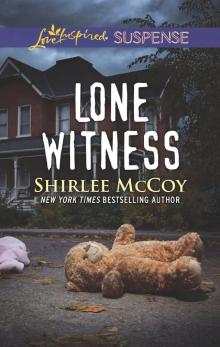 Lone Witness
Lone Witness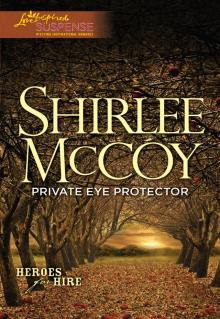 Private Eye Protector
Private Eye Protector Valiant Defender
Valiant Defender Running Scared
Running Scared Dangerous Sanctuary
Dangerous Sanctuary Capitol K-9 Unit Christmas: Protecting VirginiaGuarding Abigail
Capitol K-9 Unit Christmas: Protecting VirginiaGuarding Abigail Hidden Witness
Hidden Witness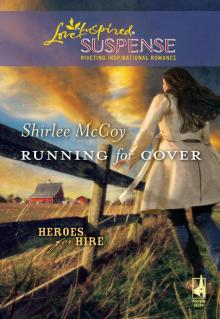 Running for Cover
Running for Cover Gone
Gone Valley of Shadows and Stranger in the Shadows: Valley of ShadowsStranger in the Shadows
Valley of Shadows and Stranger in the Shadows: Valley of ShadowsStranger in the Shadows Home with You
Home with You Out of Time
Out of Time Deadly Christmas Secrets
Deadly Christmas Secrets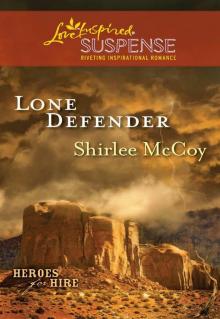 Lone Defender (Love Inspired Suspense)
Lone Defender (Love Inspired Suspense) Home Again
Home Again Die Before Nightfall
Die Before Nightfall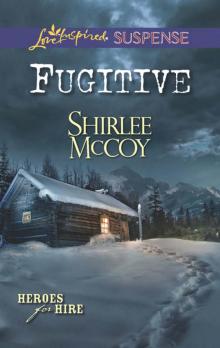 Fugitive
Fugitive Deadly Vows
Deadly Vows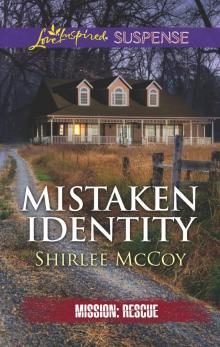 Mistaken Identity
Mistaken Identity Capitol K-9 Unit Christmas
Capitol K-9 Unit Christmas The Christmas Target
The Christmas Target SB01 - The Guardian's Mission
SB01 - The Guardian's Mission Sweet Surprises
Sweet Surprises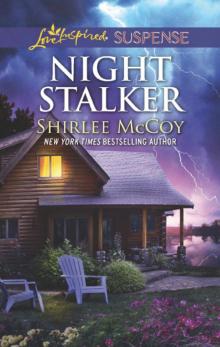 Night Stalker
Night Stalker The Cottage on the Corner
The Cottage on the Corner Love Inspired Suspense January 2014
Love Inspired Suspense January 2014 0373447477 (R)
0373447477 (R) Love Inspired Suspense March 2015 - Box Set 1 of 2: Protection DetailHidden AgendaBroken Silence
Love Inspired Suspense March 2015 - Box Set 1 of 2: Protection DetailHidden AgendaBroken Silence SB03 - The Defender's Duty
SB03 - The Defender's Duty Love Inspired Suspense June 2015 - Box Set 2 of 2: Exit StrategyPaybackCovert Justice
Love Inspired Suspense June 2015 - Box Set 2 of 2: Exit StrategyPaybackCovert Justice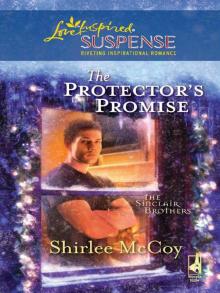 The Protector's Promise (The Sinclair Brothers)
The Protector's Promise (The Sinclair Brothers) Bodyguard
Bodyguard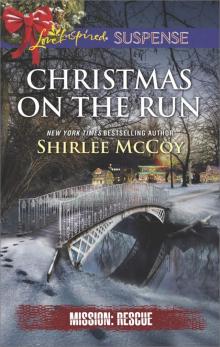 Christmas on the Run
Christmas on the Run The Orchard at the Edge of Town
The Orchard at the Edge of Town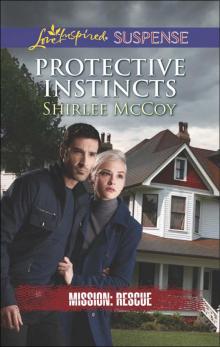 Protective Instincts
Protective Instincts Sweet Haven
Sweet Haven The House on Main Street
The House on Main Street Her Christmas Guardian
Her Christmas Guardian Undercover Bodyguard
Undercover Bodyguard